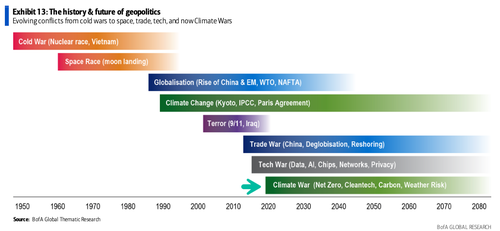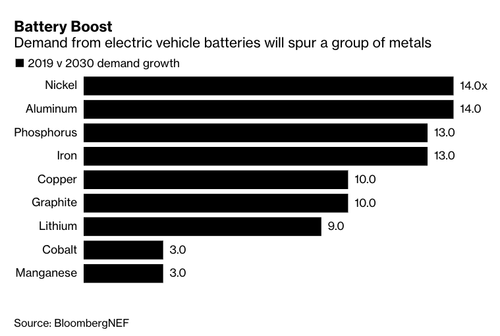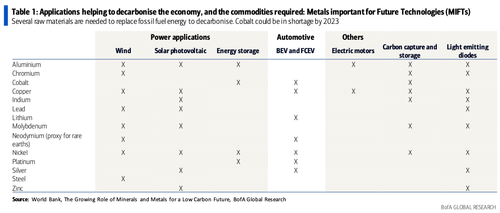Climate Wars: IEA Warns Governments To Stockpile Battery Metals
China’s dominance in green energy technologies are rare earth metal production is very concerning to the International Energy Agency (IEA), who posted a stark warning Wednesday advising western governments to stockpile critical battery metals such as cobalt and lithium.
IEA’s warning comes as the next chapter in US-China tensions will be climate wars as energy transition investment ramps up with peak oil around 2030. Many Western countries and China have estimated net-zero carbon emission economies somewhere around 2040-2060. The need for western economies to become less reliant on China for rare earth metals, such as lithium and cobalt, is a necessity for independence from the East.
China has arguably been faster in adopting green technologies than western countries. Climate wars are much more than climate action and saving the planet – it’s about the superpower race between the US and China and who can deliver climate change solutions and clean-tech.
IEA said leading industrial nations should begin to develop stockpiles of metals and minerals.
“Meeting our climate change goals will turbocharge demand for mineral resources,” Fatih Birol, the head of the IEA, told Bloomberg by phone. “Voluntary strategic stockpiling can in some cases help countries weather short-term supply disruptions.”
The problem with rare earth metals is that only a handful of countries control more than 75% of the global supply. So if disruptions, for any reason, were seen, they would immediately ripple throughout the world, seizing the production of green technologies.
Bloomberg data shows demand for rare earth metals will soar this decade as countries decarbonizing their economies.
Bank of America lists the metals that go into clean technologies.
After decades of advising governments on oil and gas markets, the agency focuses on supply chain risks of rare earth metals.
Already, China has strategic inventories of metals, but such stockpiles are not widely held in western countries. China is also the world’s largest processer and producer of such metals.
The US has a stockpiling program through the defense department of rare earth metals, but that’s not enough. There needs to be more stockpiling, mining, and production domestically or in ally countries to break the dependence on China.
US Department of Energy recently warned that the nation lacked “sufficient domestic resources to meet expected demand for certain critical materials, such as cobalt and gallium.” The US and its allies need to construct supply chains and develop robust mining facilities for such metals, or China will remain the dominant power for climate change solutions and clean-tech.
“Today’s supply and investment plans for many critical minerals fall well short of what is needed,” the IEA said. “The response from policymakers and companies will determine whether critical minerals remain a vital enabler for clean energy transitions or become a bottleneck in the process.”
In layman’s terms, IEA warns about competition for scarce resources heavily used in decarbonizing technologies as the green transition is underway. Currently, only a handful of countries control supply, and western countries need to step up their game or be displaced by China.
Tyler Durden
Thu, 05/06/2021 – 05:45
via ZeroHedge News https://ift.tt/33gJinc Tyler Durden


